Spotlight (188 found)
Voices of Refugees – Situation of Burma’s Refugees Along the Thailand-Burma Border
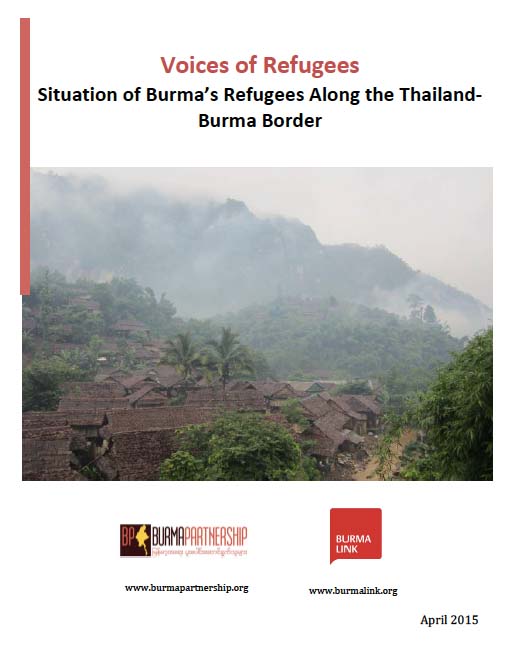 The joint briefing paper by Burma Link and Burma Partnership, Voices of Refugees – Situation of Burma’s Refugees Along the Thailand-Burma Border, which was published online on 27 April 2015, highlights how the voices of refugees continue to be neglected in Burma’s reform process.
The joint briefing paper by Burma Link and Burma Partnership, Voices of Refugees – Situation of Burma’s Refugees Along the Thailand-Burma Border, which was published online on 27 April 2015, highlights how the voices of refugees continue to be neglected in Burma’s reform process.
The briefing paper was initially launched and presented by Soe Aung at the most recently convened Association of Southeast Asian Nations (ASEAN) Civil Society Conference/ASEAN Peoples’ Forum 2015 in Malaysia, which took place between 22-24 April 2015 […]
• • •“အစိုးရသစ္ႏွင့္ ျမန္မာႏိုင္ငံ လူ႔အခြင့္အေရး အေျခအေန” အစီရင္ခံစာ
 ၂၀၁၀ ႏို၀င္ဘာလ (၇) ရက္ေန႔ အျငင္းပြားဖြယ္ ေရြးေကာက္ပြဲၾကီး အၿပီး ေပၚထြက္ လာသည့္ ေရြးခ်ယ္ခံ အစိုးရသစ္ လက္ထက္ တြင္ ႏိုင္ငံေရး၊ စီးပြားေရးဆိုင္ရာ အေျပာင္းအလဲ အခ်ိဳ႕ရွိခဲ့ေသာ္လည္း ယခင္ လူ႔အခြင့္ အေရး ခ်ိဳးေဖာက္သူမ်ားအား လံုး၀ကင္းလြတ္ ခြင့္ျပဳထားပါသည္။ ထို႔ျပင္ ယခင္လူ႔အခြင့္အေရး ခ်ိဳးေဖာက္ ခံရသူမ်ားအား ျပန္လည္ ကုစားေပးမႈ လံုး၀မရွိေပ။
၂၀၁၀ ႏို၀င္ဘာလ (၇) ရက္ေန႔ အျငင္းပြားဖြယ္ ေရြးေကာက္ပြဲၾကီး အၿပီး ေပၚထြက္ လာသည့္ ေရြးခ်ယ္ခံ အစိုးရသစ္ လက္ထက္ တြင္ ႏိုင္ငံေရး၊ စီးပြားေရးဆိုင္ရာ အေျပာင္းအလဲ အခ်ိဳ႕ရွိခဲ့ေသာ္လည္း ယခင္ လူ႔အခြင့္ အေရး ခ်ိဳးေဖာက္သူမ်ားအား လံုး၀ကင္းလြတ္ ခြင့္ျပဳထားပါသည္။ ထို႔ျပင္ ယခင္လူ႔အခြင့္အေရး ခ်ိဳးေဖာက္ ခံရသူမ်ားအား ျပန္လည္ ကုစားေပးမႈ လံုး၀မရွိေပ။
အစ္ိုးရသစ္ လက္ထက္တြင္ ႏိုင္ငံအတြင္း လႊတ္ေတာ္မ်ား၊ အုပ္ခ်ဳပ္မႈ ပံုစံမ်ား အသစ္မ်ားႏွင့္ ျမန္မာႏိုင္ငံအမ်ိဳးသား လူ႔အခြင့္ အေရးေကာ္ မရွင္တို႔ ေပၚေပါက္ လာခဲ့ေသာ္လည္း လူထု၏ အေျခခံ အခြင့္အေရးမ်ားကို ထိေရာက္သည့္ ကာကြယ္မႈေပးရန္ ပ်က္ကြက္ဆဲျဖစ္သည္။ လႊတ္ေတာ္ မ်ားမွ ဥပေဒမ်ားေရးဆြဲျပဌာန္း မႈတြင္လည္း လူထု၏ အခြင့္အေရးမ်ားကို အေလးထား ထည့္သြင္းေရးဆြဲျခင္း မျပဳေပ။ ယခင္အစိုးရ အဆက္ဆက္ လူထုအားခ်ဳပ္ကိုင္သည့္ ဥပေဒမ်ားအား ဖ်က္သိမ္းျခင္း၊ ျပင္ဆင္ျခင္း၊ အသစ္ေရးဆြဲျခင္းမ်ား မရွိသေလာက္ နည္းပါးလွ်က္ ရွိပါသည္။ ျမန္မာႏိုင္ငံ အမ်ိဳးသား လူ႔အခြင့္အေရးေကာ္မရွင္ တစ္ရပ္ေပၚေပါက္ လာ ေသာ္လည္း လူ႔အခြင့္အေရး ခ်ိဳးေဖာက္မႈမ်ားအေပၚ ထိေရာက္သည့္ ကာကြယ္မႈမ်ား မေပးႏိုင္ျခင္း၊ ၄င္းေကာ္မရွင္၏ လုပ္ပိုင္ ခြင့္မ်ားအား ထိန္းခ်ဳပ္ ကန္႔သတ္္မႈ မ်ား ခံေနရၿပီး လူ႔အခြင့္ အေရးျမွင့္တင္ရန္ ကိစၥရပ္မ်ားကိုလည္း ေဆာင္ ရြက္ႏိုင္ျခင္း မရွိေပ။ […]
• • •Southeast Asia Opium Survey 2014 – Lao PDR, Myanmar
The roots of the opium production problem in Southeast Asia go back to the 19th century. The region is home to the “Golden Triangle”, an area long associated with opium and heroin production, located where the borders of Myanmar, Lao People’s Democratic Republic (Lao PDR) and Thailand converge along the Mekong River. Twenty years ago, the Golden Triangle was the largest heroin‐producing area in the world, supplying the region’s own demand as well as exporting its surplus to North‐east Asia, Europe and the United States of America. In the 1990s and early 2000s, national and regional efforts succeeded in reducing both opium production and trade in the region, though they subsequently increased.
• • •‘If they had hope, they would speak’: The Ongoing Use of State-Sponsored Sexual Violence in Burma’s Ethnic Communities
In January 2014, the Women’s League of Burma (WLB) published a report which demonstrated the systematic use of rape by the Burma Army as a strategy to subjugate communities across the country. We documented over a hundred cases of sexual violence in the years since President Thein Sein took office – a number which we believe grossly underestimates the true scale of the problem. Drawing on evidence gathered by our member organisations across Burma, we argued that there are clear links between militarisation, investment and human rights abuses. We also proposed a number of steps to uproot the culture of impunity which surrounds sexual violence, and prevents survivors from obtaining justice. Whilst recent months have seen positive action taken in several areas, the pillars which provide impunity for perpetrators of human rights abuses remain in place. In January, we called for constitutional reform to place the military under civilian control; the establishment of effective judicial and non-judicial mechanisms to investigate human rights abuses, particularly those relating to sexual violence, and; greater participation of women in the peace process dialogue. […]
• • •Myanmar: A Tipping Point for Rohingya Rights?
 Two years after a wave of violence hit the region, Myanmar’s Rakhine State has become a segregated zone. Two million ethnic Rakhine live apart from 1.2 million stateless Rohingya, who are trapped inside displacement camps or barred from leaving their villages. Ending this segregation and protecting the rights of the Rohingya are necessary components of Myanmar’s move toward democracy. However, the Rakhine leadership has rejected – both politically and with force – any reintegration of the two communities, and it is seeking to exclude the Rohingya from any role in the state’s development, distribution of resources, and political representation. […]
Two years after a wave of violence hit the region, Myanmar’s Rakhine State has become a segregated zone. Two million ethnic Rakhine live apart from 1.2 million stateless Rohingya, who are trapped inside displacement camps or barred from leaving their villages. Ending this segregation and protecting the rights of the Rohingya are necessary components of Myanmar’s move toward democracy. However, the Rakhine leadership has rejected – both politically and with force – any reintegration of the two communities, and it is seeking to exclude the Rohingya from any role in the state’s development, distribution of resources, and political representation. […]
A Foreseeable Disaster in Burma: Forced Displacement in the Thilawa Special Economic Zone
Recent liberalization of some governmental policies in Burma (officially the Union of Myanmar) has led to the lifting of a number of bilateral sanctions and increases in foreign aid and investment. Both governments and corporations are entering into partnerships with Burmese companies to undertake major development projects, including building special economic zones (SEZ), developing hydroelectric dams, signing concession agreements for mining operations, and building pipelines. Despite their potential to create opportunities for economic advancement, such development projects are causing widespread forced displacement throughout the country, undermining the human rights of the people living in affected areas.
Forced displacement threatens people on every continent. Environmental degradation, conflict, the race for scarce resources, development projects, and land grabs have caused a significant number of these illegal displacements. People living in marginalized communities, including ethnic minorities and indigenous groups, are particularly vulnerable to forced displacement. […]
• • •Burma: Religious Freedom and Related Human Rights Violations are Hindering Broader Reforms
The dramatic political developments in Burma in recent years are of historical and geopolitical significance. Bur-ma has progressed much further than most might have imagined possible only a few short years ago. Despite these achievements, Burma still has a long journey along the road to democracy and respect for human rights. Serious violations of religious freedom and human rights continue, accompanied by disturbing evidence of prejudice and intolerance, trends that will inevitably and dramatically impact the prospects for a brighter future. In short, the political reform process in Burma is at great risk of deteriorating if religious freedom and the right to equal treatment under the law are not honored and protected. […]
• • •Legal Memorandum: War Crimes and Crimes Against Humanity in Eastern Myanmar
In January 2011, the Harvard Law School International Human Rights Clinic (“the Clinic”) began to investigate the actions of the Myanmar Army during a military offensive in eastern Myanmar (“the Offensive”) that began in late 2005 and lasted approximately three years. The Clinic sought to determine whether violations of international criminal law occurred during the Offensive, and whether there exist reasonable grounds to assert that individual military officers could be held responsible for those crimes. The Clinic’s investigation focused specifically on the conduct of two military units—Southern Regional Military Command (“Southern Command”) and Light Infantry Division 66 (“LID 66”)—in Thandaung Township, Kayin State. […]
• • •Protection and Security Concerns in South East Burma/ Myanmar
The peace process in Burma/Myanmar1 is at a critical juncture from which it could evolve into a transformative national dialogue or splinter into a divisive charade. While hopes for substantive and inclusive discussion about structural injustice remain, ongoing militarisation and attacks by the national armed forces2 are undermining the confidence of ethnic stakeholders. This report seeks to highlight the protection and security concerns of conflict-affected communities. […]
• • •Afraid to Go Home: Recent Violent Conflict and Human Rights Abuses in Karen State
The following report was prepared by Karen Rivers Watch (KRW), a coalition of six Karen organizations focused on the environment, women, youth, human rights and development issues. More information about KRW is provided on page 14.
This report is based on field interviews with local villagers and leaders of Karen armed groups, as well as media coverage of the recent conflict. It describes events that led to recent armed conflict between the Democratic Karen Benevolent Army (DKBA) and the combined force of the Burmese Army (BA) and Border Guard Force (BGF) in Karen State. Next, the report gives a detailed account of clashes that occurred along the Salween River in Hpa-an and Hpapun (Mutraw) districts. […]
• • •


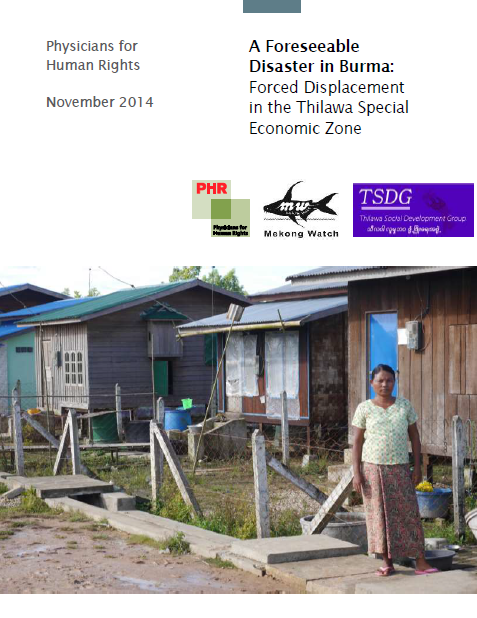
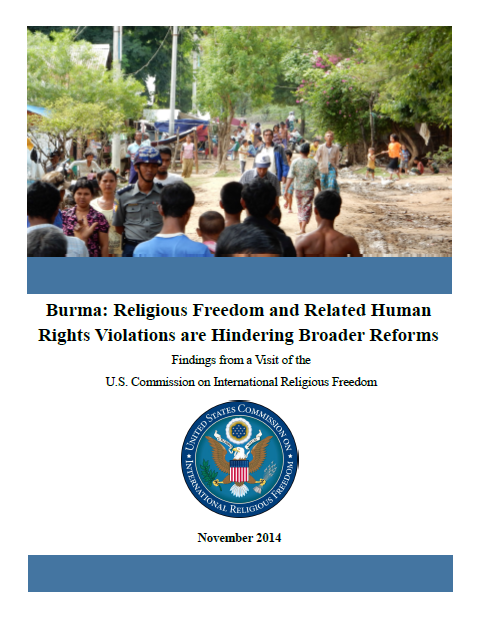
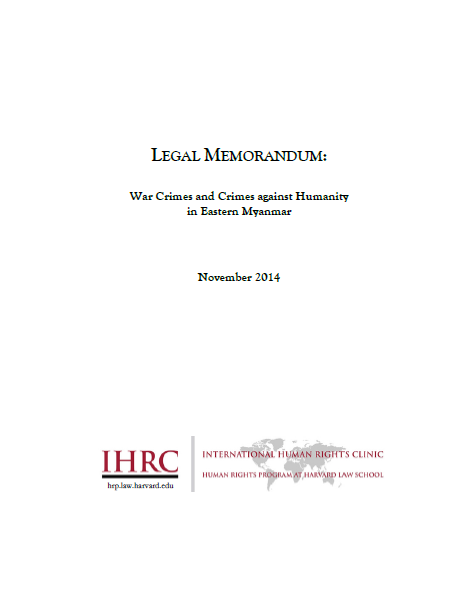
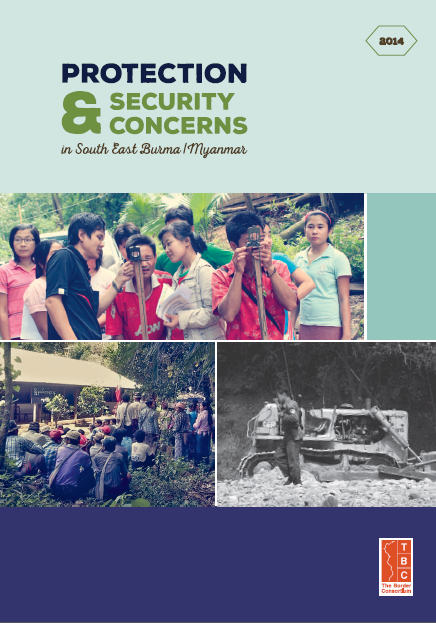
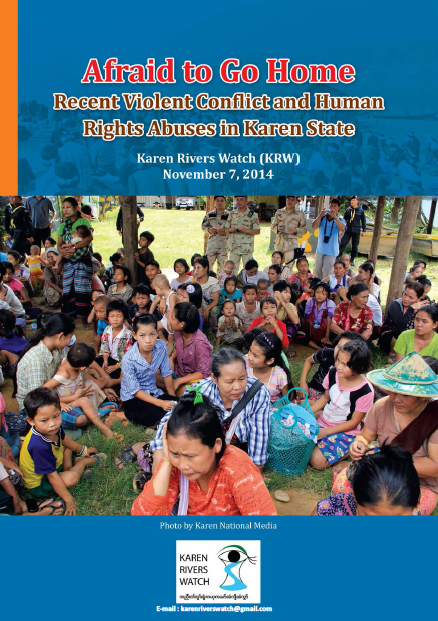








 All posts
All posts